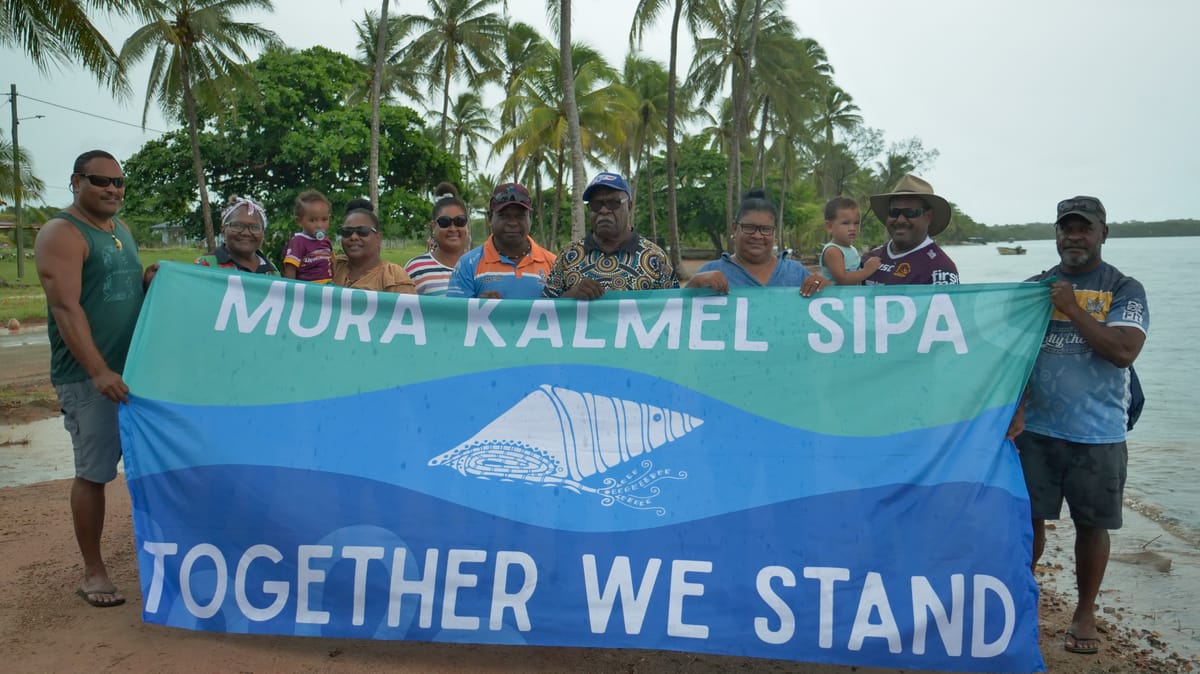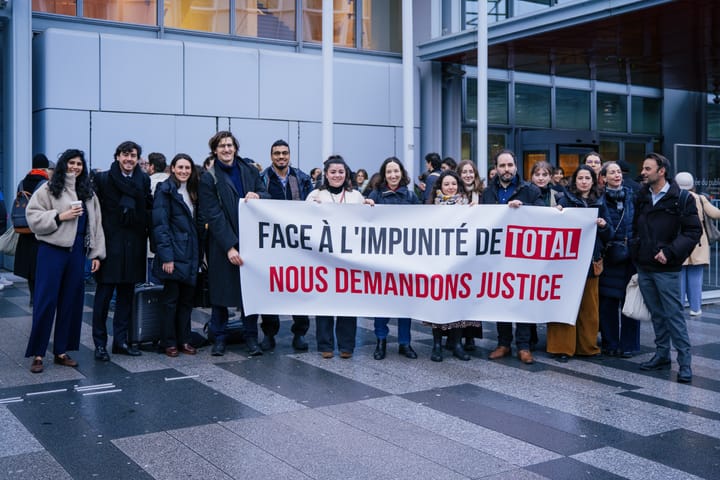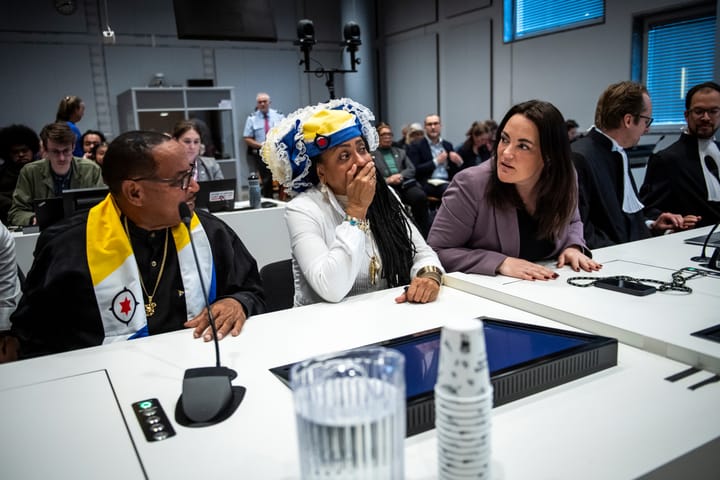"We Have To Keep Fighting”: Torres Strait Islanders Appeal Judgment In Climate Case Against Australia

As Uncles Pabai and Paul continue their landmark case, residents of Bali announce plan to sue their government following deadly floods.
Story co-published with One Earth Now
With global temperatures set to soar well beyond the limits established under the Paris Agreement and as deadly extreme weather exerts a devastating toll on communities, people on the frontlines of the worsening climate crisis continue to turn to courts in attempts to hold their governments accountable.
On November 11, just a day after the COP30 UN climate summit opened in Belém, Brazil, the pair of Torres Strait Islanders and their legal team that brought a landmark climate lawsuit against the Australian government announced they are pursuing an appeal of a federal judge’s July 15 decision finding the government does not owe the indigenous islanders a legal duty of care to protect them from climate change harms.
In the case, Pabai Pabai v. Commonwealth of Australia, the court recognized the severe climate change impacts and risks facing the inhabitants of the Torres Strait Islands and determined that the Australian government’s previous greenhouse gas emissions reduction targets were not aligned with the best available science. Yet the court still declined to find the government was in breach of its legal duties under Australian common law. The claimants in the case, Pabai Pabai and Guy Paul Kabai, will now ask the full federal court to review the decision.
“We hope that the Full Court of the Federal Court of Australia will recognize that the Commonwealth owes a duty of care to Torres Strait Islanders in relation to climate change and that the Commonwealth’s breaches of that duty of care have contributed to the harms being suffered by Uncle Pabai, Uncle Paul and other Torres Strait Islanders, including enormous cultural loss,” Brett Speigel, principal lawyer at the law firm Phi Finney MacDonald, said in a statement.
The case, filed in 2021 as a class action on behalf of all Torres Strait Islanders, sought to hold the Australian government liable for contributing to dangerous climate change and failing to protect the low-lying islands under its jurisdiction. The claimants argued the government was in breach of its duty of care under the common law of negligence, and demanded the court order the government to take steps to remedy the harm – including by rapidly reducing greenhouse gas emissions in line with the best available science.
After holding a series of evidentiary hearings, Justice Michael Wigney delivered his verdict on July 15 of this year. He accepted many of the factual underpinnings of the case and even acknowledged the likelihood that the Torres Strait Islanders may “lose their islands, their culture and their way of life and will become, as it were, climate refugees.” However, Wigney said the law “as it currently stands” provides no effective recourse for individuals suffering harms allegedly stemming from government conduct or decisions. “Governmental conduct and decisions which involve matters of high or core government policy are not properly or appropriately made the subject of common law duties of care,” Wigney stated. “The reasonableness of decisions of that nature are ordinarily to be decided through political processes, not by judges.”
Wigney’s ruling came just a week before the International Court of Justice issued its historic advisory opinion on climate change, which clarified that countries have legal obligations to address the climate emergency under multiple sources of existing international law and that governments do not, in fact, have unlimited discretion in setting climate targets or policies.
“Recently the International Court of Justice found that parties to the Paris Agreement, including Australia, have a legal obligation to set emissions targets that align with a goal of limiting global warming to 1.5°C above pre-industrial levels,” said Isabelle Reinecke, founder and national director of Grata Fund, which is supporting the Torres Strait Islanders’ case. She noted that similar cases in other countries have already succeeded. “Here in Australia, it’s only a matter of time before the law catches up.”
Belinda Lowe, head of campaigns and communications at Grata Fund, said in an emailed comment that Uncle Pabai and Uncle Paul are “committed to continuing this case.”
“Their islands are being ravaged by climate change and have been told that they have less than 30 years left, so it's not a choice,” Lowe said.
“We have to keep fighting, not just for our own communities - but for our brothers and sisters on the mainland, and in the Pacific, the bushfire and the flood survivors, the farmers and the school kids,” Uncle Paul said in a statement. “This is the greatest challenge humanity has ever faced so we have to take every opportunity to keep going.”
Bali residents to sue government after devastating floods
While Uncles Pabai and Paul take the next steps in their case, residents of another island community located roughly 2,000 miles west of the Torres Strait Islands are initiating a new lawsuit against government officials in the wake of a devastating flood event in September. This flooding on September 9 and 10 in Bali, Indonesia – the island’s worst floods in more than a decade – claimed 18 lives and caused widespread damage, and now ten Bali residents are planning to take their government to court over what they say is a failure to take responsible actions to prevent this kind of damage.
On November 13, just two days after the announcement of the Pabai case appeal, the Bali residents led by the Bali Coalition for the Environment and Sustainability Movement (PULIHKAN BALI) announced the start of their climate lawsuit. According to a press release from climate action group 350.org, the plaintiffs notified both the Central Government of Indonesia and the Regional Government of Bali of their intent to sue. The government has 60 days to respond, and if no satisfactory agreement is reached between the parties, the plaintiffs will then file a citizen lawsuit with the Denpasar District Court in Bali’s capital city.
"This citizen lawsuit is based on the government's legal obligation to protect the public's right to a clean and safe environment as guaranteed by the 1945 Constitution Article 28H paragraph (1) and Law No. 32 of 2009,” said Ignatius Rhadite, lawyer with the legal team of PULIHKAN BALI Coalition. “Negligence in spatial planning, drainage, and disaster management systems demonstrates unlawful acts by the authorities that led to the deadly September 2025 floods."
The plaintiffs are demanding that the government: 1) halt all new business permits for projects that harm Bali's environment and ecosystems; 2) conduct a comprehensive environmental assessment of the Denpasar, Badung, Gianyar, and Tabanan regions with full community participation to guide climate-resilient development; 3) reform policies to ensure equitable land use, climate-friendly infrastructure, sustainable waste management, and environmental protection across Bali; and 4) issue a Bali Provincial Regulation on Climate Justice that addresses mitigation, adaptation, and compensation for climate damages.
“This is not merely about high rainfall, but a structural problem of failed governance,” Ida Bagus Mandhara Brasika, scientist and researcher with PULIHKAN BALI Coalition, said in a statement. “Science is clear: without a development moratorium, climate disaster preparation, and immediate corrective action, similar tragedies will continue to recur. Bali needs sustainable and climate-resilient development, not development that sacrifices citizens’ safety.”
Suriadi Darmoko, plaintiff and 350.org field organizer, referenced the ICJ’s climate advisory opinion in commenting on this new case.
“The International Court of Justice climate ruling makes it clear: states have an obligation to protect its people from climate harms,” Darmoko said in a statement. “Through this action, we wish to tell the Indonesian government and COP30 leaders: we will no longer stand by idly as climate inaction destroys lives, our homes, and livelihoods. We are rising to demand justice. What we seek is not just recognition and compensation, but to be protected from future harm.”
A “significant increase in legal action” following historic ICJ opinion
The ICJ’s advisory opinion, while itself not legally binding, clarifies obligations of all UN member states under existing sources of international law that are binding, and it notes that countries can be held liable for breaching their obligations to mitigate and adapt to climate change. Experts say the opinion sets a foundation for further climate accountability litigation.
“The opinion really has been historic,” Selwin Charles Hart, UN Special Adviser to the Secretary-General on Climate Action and Just Transition, said during a COP30 side event titled “A Mandate for All: The Legal and Civic Imperative to Confront the Climate Emergency.” He said he expects to see a rise in climate litigation in many countries over the coming years.
“As we head into the second decade of the Paris Agreement, we will see a significant increase in legal action as countries confront the realities of the climate crisis,” Hart said.


